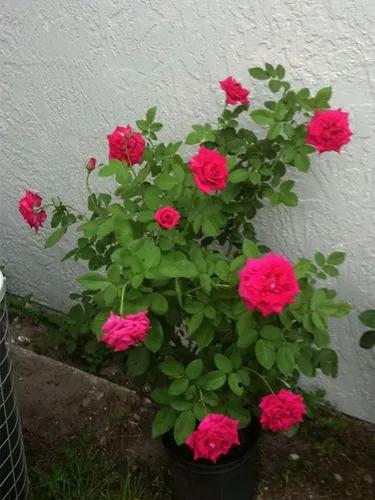Strawberry Begonia (Saxifraga stolonifera) is here to take a spot in your room and make it stand out. Its big oval leaves take up a range of hues from dark green to bronze and deep burgundy. They are also excellent air purifiers for your room!
Strawberry Begonia Care
Saxifraga stolonifera
Other names: Strawberry Geranium



Strawberry Begonia, also known as Mother-of-thousands for its many leaves, is originally from Asia and belongs to the Saxifragaceae family. While the plant does not grow very tall, between 6 and 18 inches (18-45 cm), its flower stems can grow up to 10 inches (25 cm) in proper conditions. Saxifraga makes an excellent indoor plant you can grow in containers and hanging pots. They are also cultivated as ground covers in gardens. They can produce up to 60 white, star-shaped flowers when they bloom. Its green leaves are purple underneath, and, with proper light conditions, the upper part of the leaves also gets that reddish tint on the edges.
How to Care for the Plant

Water

Strawberry Begonias require lots of water for proper growth but make sure you don’t overwater them. Let the upper part of the soil dry completely before watering again. Water them using a watering plate rather than above, so you avoid getting water on their leaves, as this might cause fungal disease. In late winter, you can reduce the watering to the minimum until the middle of spring, when you can return to regular watering. This will help the plant bloom more and keep the flowers longer.

Pruning

During the growth period, this plant will produce lots of new runners in the lower part of the pot. You can cut these to maintain the plant’s appearance or even to grow new plants from them. Remove any dying or dried leaves or plant parts to encourage plant growth, but don’t cut on the yellow tissue of the plants, as this might spread possible disease to the rest of the plant and give the growth rhythm a shock.

Fertilizer

Fertilize Strawberry Begonias weekly during the spring season with a diluted liquid fertilizer. You can follow the same pattern for fertilization as you do with watering in late winter. It's best to keep it to the minimum until the middle of spring, so the flowers are encouraged to bloom.

Sunlight

Keep the Strawberry Begonia out of direct sunlight, which might burn the leaves quickly. They like receiving bright light, especially during spring, when the plant gets ready to bloom. An east- or west-facing window would be a great choice.

Soil

Use well-draining soil for potting this plant. Use pre-mixed potting soil containing perlite, sand, peat moss, and neutral to acidic pH levels. You can also use regular potting soil; it will not affect the plant too much as long as you ensure it does not hold water; otherwise, it might develop root rot.

Propagation

Strawberry Begonia propagation is easy, as it produces many offsets during growth. It is also necessary, as the plant does not thrive for more than a few years. Place these runners in individual pots with sandy soil away from direct light. The roots will form quickly, and you can start to water the new plants just like you do with the mother plant.

Temperature

Strawberry Begonias prefer cooler temperatures than warm temperatures and will thrive in temperatures between 50°F and 70°F (10°C-21°C). Please don’t keep it in very humid air, as this can encourage fungal disease. Average humidity is ideal for this plant, but look out for dry leaves because this might indicate the plant does not get enough moisture.

Container

Use a pot with drainage holes, as Strawberry Begonia does not like being in soggy soil. You will need to re-pot it once every three years or when it starts to outgrow its container. They prefer to be pot-bound rather than have a lot of space, so don’t use a container that is too big for the plant.

Fun fact

Despite being called “Strawberry Begonia,” this plant has nothing to do with strawberries or begonias. Its name comes from tiny white flowers that look like strawberries ones. The leaves also resemble begonia leaves, but Strawberry Begonia has its own growth rules and is already remarkable.

Popularity

1,686 people already have this plant 303 people have added this plant to their wishlists
Discover more plants with the list below
Popular articles






